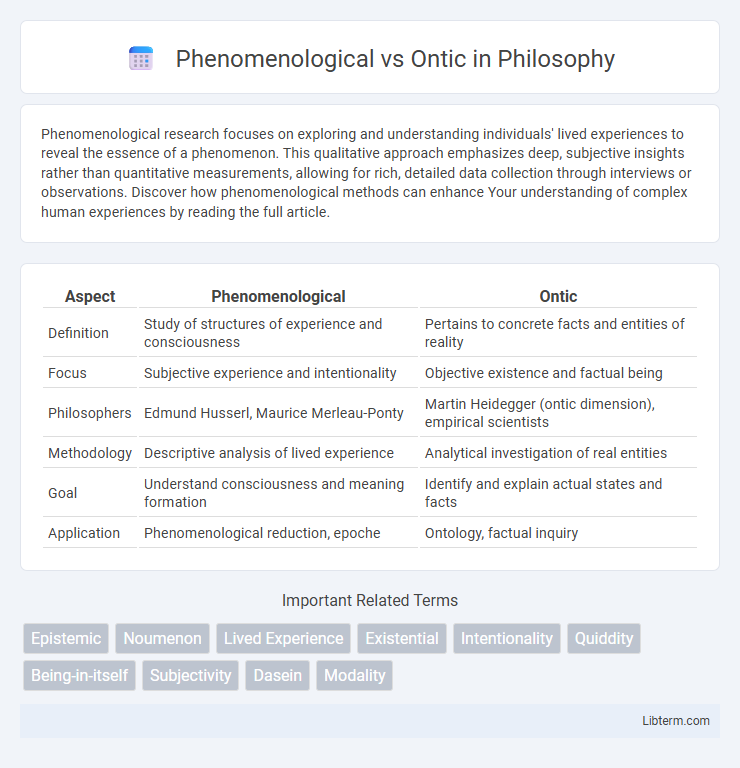Phenomenological research focuses on exploring and understanding individuals' lived experiences to reveal the essence of a phenomenon. This qualitative approach emphasizes deep, subjective insights rather than quantitative measurements, allowing for rich, detailed data collection through interviews or observations. Discover how phenomenological methods can enhance Your understanding of complex human experiences by reading the full article.
Table of Comparison
| Aspect | Phenomenological | Ontic |
|---|---|---|
| Definition | Study of structures of experience and consciousness | Pertains to concrete facts and entities of reality |
| Focus | Subjective experience and intentionality | Objective existence and factual being |
| Philosophers | Edmund Husserl, Maurice Merleau-Ponty | Martin Heidegger (ontic dimension), empirical scientists |
| Methodology | Descriptive analysis of lived experience | Analytical investigation of real entities |
| Goal | Understand consciousness and meaning formation | Identify and explain actual states and facts |
| Application | Phenomenological reduction, epoche | Ontology, factual inquiry |
Introduction to Phenomenological and Ontic Perspectives
Phenomenological perspectives analyze human experiences and consciousness, emphasizing how individuals perceive and interpret phenomena subjectively. Ontic perspectives concentrate on the nature of being and existence, exploring entities independently of human experience or perception. Understanding the distinction between phenomenological and ontic approaches is essential for comprehensively studying reality and knowledge.
Defining Phenomenology: Core Concepts
Phenomenology centers on the direct exploration of conscious experience and the structures of phenomena as they appear to the individual. Core concepts include intentionality, the idea that consciousness is always about or directed toward something, and epoche, the suspension of judgment to reveal pure experience. This approach contrasts with ontic inquiry, which focuses on the nature of actual beings and objective existence beyond subjective perception.
Understanding Ontic Reality: Key Principles
Understanding ontic reality involves examining entities as they exist independently of perception or interpretation, emphasizing their objective properties and states. Ontic analysis prioritizes the actual existence and structure of phenomena, distinct from phenomenological focus on subjective experience or consciousness. Key principles include recognizing the intrinsic characteristics and causal relations that define reality at its foundational level.
Historical Roots of Phenomenological vs Ontic Approaches
The historical roots of phenomenological and ontic approaches trace back to early 20th-century philosophy, where Edmund Husserl established phenomenology by emphasizing the direct investigation of conscious experience and phenomena as they appear. Ontic approaches arise from classical metaphysics and existentialist traditions, focusing on the nature of being and existence beyond mere phenomena. These foundational differences highlight phenomenology's commitment to subjective experience and ontology's engagement with the fundamental structures of reality.
Philosophical Differences: Being vs Existence
Phenomenological inquiry examines subjective experience and consciousness as primary modes of being, emphasizing how phenomena appear to the self. Ontic analysis addresses the objective existence of entities independent of perception, focusing on the factual status of beings within reality. The philosophical difference centers on phenomenology's exploration of meaning and intentionality versus ontology's concern with what exists and the nature of existence itself.
Methodological Distinctions in Inquiry
Phenomenological inquiry centers on the subjective experience and intentionality of consciousness, emphasizing the description of phenomena as they appear to the lived experience. Ontic inquiry prioritizes the investigation of the nature of being and existence, focusing on the factual and structural conditions underlying entities. Methodologically, phenomenology employs epoche and reduction to bracket presuppositions, while ontic research relies on empirical observation and analytical categorization to reveal ontological realities.
Applications in Science and Humanities
Phenomenological approaches in science and humanities emphasize the direct investigation of lived experiences and conscious phenomena, facilitating qualitative insights into perception, cognition, and social interactions. Ontic perspectives prioritize the study of entities and their objective existence, enabling quantitative analysis and empirical validation in disciplines such as physics, biology, and ontology-based information systems. Integrating phenomenological and ontic methodologies enhances interdisciplinary research by bridging subjective experience and objective reality for comprehensive understanding.
Major Thinkers: Husserl, Heidegger, and Beyond
Edmund Husserl, the father of phenomenology, emphasized the study of structures of consciousness and phenomena as they appear, laying the foundation for the distinction between phenomenological (the study of experience) and ontic (the study of concrete being) levels. Martin Heidegger expanded this framework by focusing on ontic existence (Dasein) and ontological questions, exploring the nature of Being beyond mere phenomena. Subsequent thinkers like Maurice Merleau-Ponty and Jean-Paul Sartre further developed the interplay between phenomenological description and ontic reality, deepening the understanding of human experience and existence.
Implications for Knowledge and Reality
Phenomenological approaches prioritize human experience and consciousness, emphasizing how phenomena appear to individuals, which profoundly shapes subjective knowledge and its limits. Ontic perspectives focus on the nature of being and existence itself, asserting that reality has an objective structure independent of perception, thus grounding knowledge in external facts. Understanding the tension between phenomenology and ontology influences epistemology by challenging whether knowledge is experiential or rooted in an independent reality.
Conclusion: Integrating Phenomenological and Ontic Insights
Integrating phenomenological and ontic insights enhances the depth of understanding by combining lived experience with objective realities, offering a comprehensive approach to complex phenomena. Phenomenology captures subjective meaning and consciousness, while ontic analysis addresses empirical and factual existence, creating a balanced framework for inquiry. This synthesis improves interdisciplinary research, fostering richer interpretations in fields like psychology, philosophy, and cognitive science.
Phenomenological Infographic

 libterm.com
libterm.com